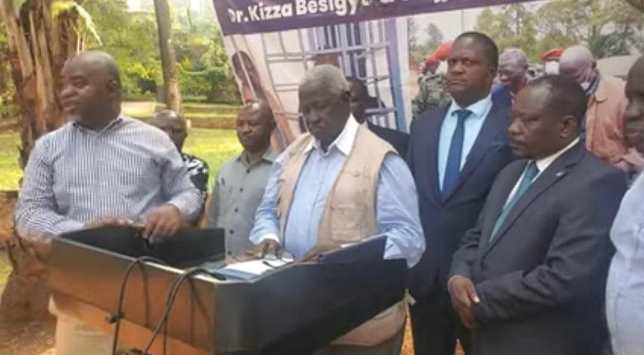Check also: Ugandan government shuts down social media ahead of elections
His chief rival Kiiza Besigye who is in second place with 33% was arrested again on Friday after police stormed his party headquarters in the capital.
The police raid came as people continued to vote at dozens of polling stations in the wider Kampala area, where voting was extended in 36 sites for a second day after delays on Thursday that Commonwealth election observers called “inexcusable”.
While president Yoweri Kaguta Museveni maintained his lead in the presidential tally, at least 17 of his ministers lost their parliamentary seats, among them defence minister Crispus Kiyonga who is spearheading regional efforts to end the political crisis in Burundi and attorney general Fred Ruhindi.
[mappress mapid=”7″]
President Yoweri Kaguta Musevei who faced a challenge from seven candidates is expected to win re-election for a fifth term in office and extend his 30-year rule of the east African country.
Thursday’s presidential and parliamentary votes were disrupted in the capital Kampala by the late arrival of ballot boxes and papers, angry demonstrations by frustrated voters and police using tear gas. At nearly 28,000 other polling centres voting passed off smoothly on election day.
Besigye, who was arrested during campaigning on Monday and again on Thursday evening, was taken into custody for a third time on Friday.
Police surrounded Besigye’s Forum for Democratic Change (FDC) headquarters, firing tear gas and water cannon, before bursting inside and arresting top party officials. Some reasonable measures have been applied to rein in FDC supporters who wanted to disturb the peace and the ongoing exercise,” said senior police officer Felix Andrew Kaweesi.
He accused Besigye’s FDC of planning to publish its own tally of results, contravening electoral law.
The US embassy in Kampala condemned the “disproportionate police action” in raiding the party office and advised US citizens to stay at home, “due to reports of police and military clearing the streets.”
The Citizens Election Observers Network-Uganda (CEON-U) said the election had been “relatively peaceful” but noted “some serious shortcomings in adherence to (international) standards”. Over 15 million Ugandans were registered to vote for both a president and members of parliament, with 290 seats contested by candidates from 29 political parties.
The leading presidential candidate requires more than 50 percent of votes cast to avoid a run-off with initial full results expected as early as Saturday. Disenchantment with politicians, their politics and the faltering economy has been increasing in a country, where the median age is less than 16.
Voter turnout has followed a downward trajectory in recent elections with nearly three-quarters of eligible voters casting a ballot in 1996, during the country’s first-ever competitive election, but only three-fifths turning out in 2011.
Museveni’s share of those votes has also declined although he won his last five-year term in 2011 with 68 percent.
Source: news24
Check also;
- Ugandan Government Blocks Access To social Media Ahead Of Museveni’s Swearing In
- Uganda Court Confirms Museveni’s Re-election
- Police In Uganda Surrounded FDC Leaders, Ingrid Turinawe Missing
Please use the button below to contribute to Newslex Point, Inc. using a credit card or via PayPal.

 Newslex Point News in Uganda, Uganda news
Newslex Point News in Uganda, Uganda news












